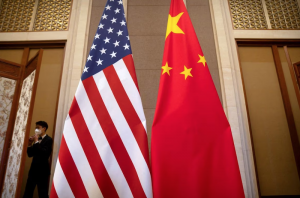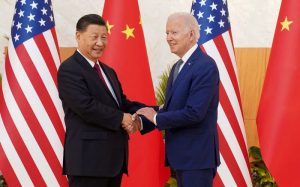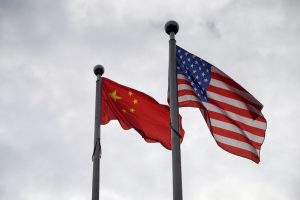(ATF) As China heads into its ‘new era’ of high tech development in all areas of society it means that in a very relatively short period of time China will have a new economy, with new rules and a new perception of the internet, the Internet of things, and use of technology in industry and finance.
In recent years, the internet has continued to grow exponentially and shake up various industries around the world and even entire economic rules. In China, all kinds of “Internet thinking” represented by firms like Xiaomi have subverted various industries forcefully.
So, at this current stage, what are the new rules and new ‘Internet thinking’ and style of business coming around the corner?
What is the new economy?
With continuous innovation in science and technology, we are entering a new economic world: Here, computers are getting smaller and smaller, while communication exchanges are increasing. Digital technology and media are ultimately communication services, and communication is no longer just economic – part of it is the economy.
The new economy, according to China’s First Management School, is about communications. Communication has become the foundation of society, culture, humanity, self-awareness, and all economic systems, which is why the internet is so important.
The new economy has three distinctive features: first, it is global; second, it focuses on intangible things, such as opinions, information, and relationships; third, it is closely connected to each other. These three attributes of the new economy have given birth to new market positioning and social forms, which will be a society deeply rooted in the ubiquitous network.
What is the future of industrial production?
In a “smart” manufacturing factory in Shanghai, you will be able to see a series of services such as order placement, production scheduling, monitoring, and quality inspection for the industry, plus dynamic monitoring and remote diagnosis for machine production and operation.
In November 2020, the 10th Plenary Session of the 11th Shanghai Municipal Party Committee proposed that Shanghai should comprehensively promote a digital transformation of the city and build an international digital capital with world influence. Shanghai seized the opportunity and launched a three-year action plan for the Industrial Internet – “Work Fu Shanghai”.
Looking back, a large number of young technology and innovation companies have emerged in Shanghai’s process of laying the foundation equipment and talent for the industrial Internet, and Jiuwu Internet is one of them.
Founded in 2015, Jiuwu Internet is a science and technology enterprise that can provide complete industrial Internet solutions, mainly for industrial enterprises to provide rapid industrial application development solutions and implementation of operation and maintenance services.
The company’s core product is the “Nine Things Cloud”, a low-code platform for the Industrial Internet. Software engineering is actually to solve space problems. The length is the business field, the width is the organisation’s digital ability, and the height is the vertical depth of the new generation of IT.
Jiuwu Cloud helps a CXO – chief experience officer – solve a problem, such as a middle and back-end application problem, and solve the business issue for his or her independent and controllable business. Jiuwu studio will provide a hybrid integrated application. Jiuwu Cloud is connected to a large number of devices, and at the same time solves the problem of the device IoT background application that belongs to the CXO vertical.
It is understood that the platform provides a series of tools such as data modelling, protocol adapter, rule engine, workflow engine, page configuration, 2D/3D visualisation engine, “intelligent” algorithm engine, which can flexibly and efficiently help customers build their own Internet of Things business applications and greatly reduce development costs while simplifying and improving operation and maintenance capabilities.
In short, the Internet of Things (IoT) aims to solve some common technology and platform problems of the industrial Internet, and through efficient, low-cost, and reduced production links, it produces valuable industrial apps.
When this is rolled out fully into China’s behemoth state sector there will need to be a lot of changes over the next few years.
Entrepreneurship: the dual birth of opportunities and insights
Feng Xin, CEO of Jiu Internet of Things, revealed that the name of Jiu Internet of Things has a special meaning: “Things are the Internet of Things, and Jiu is the largest number among the numbers (in Chinese), so Jiu Things means everything, like saying the ‘Internet of Everything’.”
Prior to this, the founding team of Jiuwu Internet had been deeply involved in the field of automation control during the 10 years from 2000 to 2010. As market information became more and more transparent, it was necessary to find ways to make breakthroughs. As a result, Jiuwuren began to delve into the Industrial Internet, knowing that the Industrial Internet is in a period of transformation, and a new industry is about to rise.
Since the establishment of Jiuwu Internet, many good products have been made. It was the first to cooperate with Philips to make light networking products and participate in joint exhibitions at the International Communication Conference.
Government seed capital
From 2017 to 2019, Feng Xin mainly engaged in product research and development on the programme cloud. In 2019, he and Shanghai Jiaotong University jointly applied for a major national special project. The total investment in the three-year period is about 38 million yuan. It is now in the mid-term and has won Alibaba Cloud awards and various other gongs. Up to now, Jiuwu Internet has served a number of Fortune 500 customers.
Although industrialisation is very hot, Jiuwu Internet clearly understands that the Industrial Internet is still in a tentative forward stage for most customers. It is affected by multiple factors, such as high technical costs, market factors, and talent factors. The Industrial Internet is actually on the eve of its outbreak period, and it has not yet reached the real outbreak period. To truly implement it, it requires persistent effort.
When it comes to the company’s future development plans, Feng Xin is very clear about his direction to bring China “smart manufacturing power.”
Relying on opportunities and insights into development of the times, Jiuwu Internet is moving towards the direction of the Industrial Internet and has been working hard for nearly four years. Jiuwu Internet actively participates in industry organisations, has ecological cooperation with Ali, Microsoft, and others, and has a series of copyrights, patents and superior technologies of its own products.
Facing challenges and opportunities: talent is indispensable
People are not unfamiliar with all kinds of mobile apps. Douyin and WeChat are all consumer-level apps.
However, the original intention of Jiuwu Internet Industrial app is to lower the production threshold of the entire industrial application, to help users and enterprises save costs and improve efficiency. The next step of Nine Internet of Things is to produce industrial apps that are more professional, simpler, and more industrial. According to the forecast of the Ministry of Industry and Information Technology, about 300,000 industrial apps are expected to land in 2021, and enterprises or governments will assume the responsibility for development and cost.
Industrial Internet companies have their own business difficulties. In Feng Xin’s view, thousands of similar companies that have emerged on the platform are in fact uneven, and many of them have not really penetrated the Industrial Internet, but have emerged from the surface and made concepts.
Large industrial suppliers mainly rely on capital operation and some integration to build an ecosystem, but it is still not enough to implement specific solutions, and they are not deep, detailed, and specialised in key areas. Facing the shortage of talent and lack of training in emerging industries, Jiuwu Internet has always put talent in an important position in the development of the enterprise. At the same time, it has made efforts in education, strengthened school-enterprise alliances, achieved integration of production, education and research, and used production to feed students back to make up for the talent gap. Shanghai’s huge potential in absorbing talents and market exploration is gradually attracting regional gatherings of homogeneous Industrial Internet companies.
In its next step, Jiuwu Internet will cooperate with Shanghai Jiaotong University in a joint laboratory. With the help of the brand, technology, forward-looking and scientific research results behind Jiaotong University, Jiuwu Internet has carried out integration of various resources, according to the Peoples’ Information Network.
The sudden emergence of the coronavirus epidemic has stimulated the demand for Industrial Internet products, and the market has significantly increased. Some projects that were originally conceptualised have gradually begun to develop from a practical perspective. In the midst of the trend, the Internet of Things has once again caught up with the development opportunity.
Policy support: strong growth in Shanghai
In recent years, China’s innovation and entrepreneurship have flourished. As the country’s economic development has entered a new era and a “new normal”, technology entrepreneurship characterised by high value, high return and high risk has gradually become a new theme for entrepreneurship.
As one of the central cities of the country’s economic development, Shanghai has provided related support policies for SMEs through various “new era” information and service methods. Jiuwu Internet is the new ‘model worker’ emerging from the new government initiatives.
























